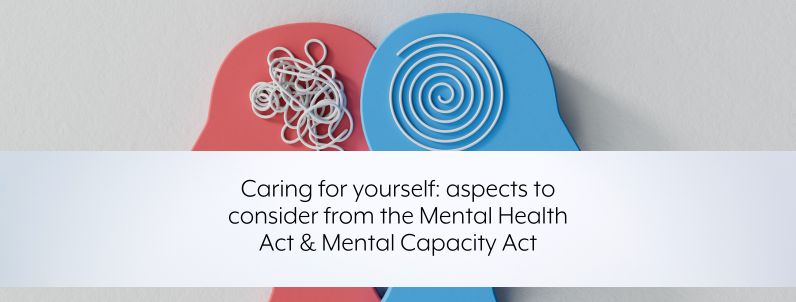
Having experienced a lack of control in childhood, many of us continue to fear a lack of control in adult life, especially when we are plagued by the symptoms of traumatisation and conditions such as PTSD or DID. Rather than engaging with mental health services because we trust that they will be helpful, many of us—rightly or wrongly—fear any involvement with them partly because we fear losing further control by being ‘sectioned’. We fear losing our liberty, losing the right to make decisions about our life, and losing the right to choose the kind of treatment we receive. In this article we will provide a brief overview of the Mental Health Act, the most relevant sections from it, and then look at how it differs from the Mental Capacity Act. We will then look at various tools and legal structures that we can use to plan for a future where we might encounter either the MHA or the MCA, including the Lasting Power of Attorney, Displacement of Nearest Relative, and Advance Statements.
The Mental Health Act
The Mental Health Act is a law in England and Wales about detaining and treating people with a ‘mental disorder’. Under the MHA, people can be made to stay in hospital (‘being sectioned’) and can receive treatment against their wishes. They may also be given a Community Treatment Order which specifies that, although living at home, they must do certain things, such as take their medication. The MHA has 5 guiding principles, which are summarised as follows:
- Give treatment in the least restrictive way and help people to be as independent as possible
- Involve patients
- Respect patients, families, carers and friends
- Help people get well
- Make fair and efficient decisions.
In order to be admitted to hospital against your wishes, certain people must agree that you have a mental disorder and that you are putting your own safety or someone else’s at risk. You be will be assessed and can be given treatment—even if you don’t want it. You have certain rights under the Mental Health Act, including the right to appeal and the right to get help from an advocate. The MHA also provides for free aftercare (section 117) once you leave hospital under certain sections.
The MHA applies to England and Wales and contains two parts: ‘civil’ sections (for people who have not committed a crime) and ‘forensic’ sections (for people who have, or who are suspected of having done so.)
A ‘mental disorder’ is defined as ‘any disorder or disability of the mind’ and includes mental health conditions including schizophrenia, depression, bipolar, OCD, anxiety disorders, eating disorders, and personality disorders. Although rarely recognised by psychiatrists, DID would also classify as a disorder, even if misdiagnosed as another condition. ‘Mental disorder’ also refers to dementia, behaviour changes following traumatic brain injury and autistic spectrum disorders. Learning disability is only included where it is associated with abnormally aggressive or seriously irresponsible behaviour, and drug and alcohol misuse is not counted as a mental disorder on its own—the MHA would only apply if the person has a dual diagnosis.
It normally requires three people to agree to someone being detained in hospital (sectioned), but this can differ depending on the circumstances and how urgent it is. In general, the three people would be:
- an Approved Mental Health Professional (AMHP), such as a psychologist, social worker, occupational therapist or nurse; or the ‘nearest relative’
- a section 12 doctor (a doctor who has received specialist training)
- a registered medical practitioner (such as a GP).
The table below shows the most important sections of the MHA and the purpose and parameters of each. Of particular relevance to many people with dissociative disorders are sections 135 and 136 which allow the police to come into your home or remove you from a public place to take you to a ‘place of safety’. The police do not need medical evidence before removing you—they just need to reasonably think that you are mentally ill and that they need to move you to keep you and other people safe. A ‘place of safety’ can be an A&E department or a ‘place of safety suite’ at a psychiatric hospital. It could also be the home of a relative or friend, which may pose particular dangers if relatives are abusive. However, most commonly the police will take you to a police station and you will be detained in a cell until you can be assessed. You can be held for up to 72 hours until an Approved Mental Health Professional and/or doctor sees you. Once assessed you will be released, taken to an inpatient hospital as a voluntary patient, or detained under another section of the Mental Health Act.
Displacement of nearest relative
The ‘nearest relative’ is a legal term under the Mental Health Act 1983 and is not the same as the ‘next of kin’. Under the MHA, the ‘nearest relative’ has certain rights and responsibilities if you are detained in hospital under sections 2, 3, 4 or 37, whereas the ‘next of kin’ has none. The box page 14 shows the list for determining who your nearest relative is, which is strictly adhered to as part of the law. The ‘nearest relative’ only applies to the Mental Health Act 1983 and not in other situations.
The nearest relative:
- can ask for an assessment to decide if their relative should be sectioned under the Mental Health Act;
- must be consulted by the Approved Mental Health Practitioner before their relative can be detained under a Section 3, unless this is impractical or would cause delay; but if the nearest relative objects, it makes being sectioned much more difficult;
- must be told within a reasonable timeframe if their relative is going to be detained under Section 2 unless it would cause emotional distress, physical harm or other exploitation to their relative;
- can be consulted about treatment decisions;
- can request for their relative to be discharged from hospital (but this may be overruled by the Responsible Clinician);
- can apply for a discharge from a Community Treatment Order;
- can delegate their rights to another person by writing to the chosen person and to the Hospital Managers.
People from abusive families or difficult situations may wish to ‘displace’ the nearest relative and appoint someone else instead. For example, it may not be appropriate for a spouse or civil partner to be the nearest relative if you are in a domestic violence situation, and neither would it be helpful (for unmarried people without children over the age of 18) to have an abusive parent take that role. In these situations, you can make an application to the County Court to ‘displace’ your nearest relative on the grounds that the nearest relative ‘is otherwise not a suitable person to act as such’. You can represent yourself in Court if you cannot afford a Solicitor, although you may in some circumstances be entitled to Legal Aid. At the time of writing, the correct form to use is N1 which can currently be downloaded at https://www.gov.uk/government/publications/form-n1-claim-form-cpr-part-7 This should be sent along with the Court fee (search for form EX50 for a list of fees) to your nearest County Court—go to https://courttribunalfinder.service.gov.uk/search/.
If someone does not have a nearest relative, the local County Court will, under Section 29, appoint a nearest relative. The person involved may nominate their choice of nearest relative, but the Court will have the final say. If a nearest relative objects to a Section 3 without good cause, the Approved Mental Health Practitioner can also apply to the Court to have them displaced.
Mental Health Act Mental Capacity Act: what’s the difference?
Mental capacity is different to mental illness. Someone may be mentally ill and yet still have mental capacity, and someone may be mentally well but lack mental capacity. In addition, someone can both lack mental capacity and be mentally ill, and in ideal circumstances people will both have mental capacity and be mentally well, as this quadrant shows:
| Has mental capacity Is mentally ill MHA |
Has mental capacity Is not mentally ill Neither |
| Does not have mental capacity Is mentally ill MHA/MCA |
Does not have mental capacity Is not mentally ill MCA |
What is mental capacity?
Mental capacity is the ability to make your own decisions. When you make a decision you need to be able to:
- understand the information relevant to making that decision
- use or weigh up that information
- keep or remember that information
- have the means to communicate your decision to someone else.
You may lose capacity because of a mental illness, brain injury, stroke, severe learning disability or if you have used alcohol or drugs.
How is mental capacity assessed?
The Mental Capacity Act has a specific test for assessing if you have capacity to make a decision at a particular time. The test is not based on your symptoms or diagnosis alone—for example, a diagnosis of schizophrenia will not by itself indicate a lack of mental capacity. The test has to be done for each decision that you are making, because you might be able to decide what you want for lunch but be unable to make a decision about long-term financial investments.
There are two parts to the test of capacity under the MCA:
- Medical professionals must decide if you have an injury or illness which affects the way your brain or mind works, and whether the effects are so severe that you cannot make a particular decision.
- You will be tested to see if you have capacity by assessing if you can:
- understand the information needed to make the decision
- remember and recall that information
- understand the result or outcome of the choice you are making
- tell people your decision, for example by talking, using sign language or squeezing someone’s hand.
You cannot be deemed to lack mental capacity if you are just making an unwise decision, and nor can you be deemed to lack mental capacity just because you have a particular diagnosis.
What can i do if i am worried about losing capacity?
Whilst you still have mental capacity, you can register a Lasting Power of Attorney (LPA). This will pass decision-making powers to certain people whom you specify (your ‘attorneys’). You can choose for them to be able to make decisions on your behalf straightaway (for example, financial decisions while you are abroad) or you can stipulate that they can only step in once you lose mental capacity.
What is a Lasting Power of Attorney (LPA)?
A Lasting Power of Attorney is a legal document that is sealed by the Court of Protection. It allows you to appoint one or more people (your ‘attorneys’) to make certain decisions on your behalf if you lose mental capacity.
Who is a Lasting Power of Attorney for?
To make an LPA you must:
- be over the age of 18
- have the mental capacity to make the decision to have an LPA
- have someone sign to say that you have the mental capacity to make an LPA—this can be a professional such as a doctor, social worker or solicitor, or someone who has known you for more than 2 years and is independent and will not benefit from the LPA
- have one or more people who are willing to act as your ‘attorney’
- have one or more people who are willing to be informed of your decision to register a LPA and can object or raise concerns to the Office of the Public Guardian—this is a safeguard to ensure that you are not being coerced into it.
What might happen if i don’t have an LPA?
If you don’t have an LPA, many decisions will be taken on your behalf either by medical professionals or your next of kin or relatives. In situations where you have a domestically violent partner or spouse, or abusive parents, this could put you in a very worrying situation. A Lasting Power of Attorney gives you security in this kind of scenario, for example if you have a stroke or enter a coma following a car crash. It would mean that your ‘attorneys’ are entitled to make decisions about you regarding your care (such as ongoing life support) and can receive information about you, and abusive family members or partners will be prevented from doing so. Your ‘attorneys’ can only make the kinds of decisions that you stipulate in your LPA.
Why make an LPA?
- it ensures that the people you have chosen can make decisions on your behalf, rather than strangers or abusive family members
- it allows you to stipulate the kind of care and treatment that you wish to receive, so your wishes are more likely to be followed
- it makes it easier for the people around you to be able to act on your behalf and know what decisions you would want them to make.
What would my attorneys do?
- they must follow your instructions as written on the LPA, but you cannot instruct them to do anything illegal
- they must follow the Mental Capacity Act Code of Practice
- they must make sure that you are allowed to make as many decisions for yourself as you can
- they must make sure that any decisions they make are in your best interests
- they must not take advantage of their position, and only make decisions which benefit you
- they must not let other people make decisions, unless they have the right to do so, such as a doctor
- they must respect your privacy
- they must follow any directions given by the Court of Protection
- they must not give up the role without first telling you and the Court.
What does an LPA cover?
There are two types of LPA:
- Health and Welfare
This covers areas such as your daily routine, for example washing, dressing and eating, your medical care, and life-sustaining treatment. This will only come into effect once you lose mental capacity. - Property and Financial Affairs
This covers areas such as managing a bank account, paying bills, collecting benefits and selling property. This can come into effect while you still have mental capacity if you so desire.
You can register one or both. The attorneys you appoint can be the same or different on each one.
How do I make an LPA?
- Choose your attorney(s).
- Fill in the forms to appoint your attorneys and specify your instructions. The forms can be currently found at https://www.gov.uk/power-of-attorney. You can also instruct a solicitor to do it for you, but this is more expensive.
- Register your LPA with the Office of the Public Guardian, which can take up to 10 weeks and costs £110 per LPA, unless you are entitled to a reduction due to low income.
Advance Statements
According to the NHS, an Advance Statement is:
a written statement that sets down your preferences, wishes, beliefs and values regarding your future care. The aim is to provide a guide to anyone who might have to make decisions in your best interest if you have lost the capacity to make decisions or to communicate them.
Advance Statements are also known as Advance Requests and are becoming increasingly common within many NHS Trusts and some provide a specific form to fill in to register your Advance Statement with them, which is then attached to your medical records. You can also write your own (see here for a template), including information such as who to contact in an emergency (and who NOT to contact), and clear statements about your preferences for treatment, as well as perhaps practical arrangements for caring for children and pets etc. It is important to be realistic when writing an advance statement, focusing on the main priorities and what is practicable.
Having signed and dated your Advance Statement in front of a witness, who also signs and dates it, you then need to make sure that professionals are aware that your advance statement exists and where to locate a copy. You could for example give a copy to your GP, your mental health team, your therapist and a person of your choice (for example, a close friend, relative or an ‘attorney’ if you have a LPA). You could also include details of where to locate it on your crisis card.
If you change your mind about what you have put on your advance statement, it is important to update it as soon as possible and have your signature witnessed again. Even without making changes, it is a good idea to review it regularly and provide updated copies so that it is as clear as possible that your wishes are still current. You can also revoke your statement, which should involve destroying the original copies to avoid confusion, and informing people who had access to it.
An advance statement is not legally binding, but increasingly medical professionals are becoming aware of them and taking them more seriously. However, there are times when health professionals will overrule your wishes, including:
- when a health professional judges that the treatment you have requested or refused is not in your best interests
- if the treatment you ask for is illegal—for example, asking a doctor to end your life
- if it is an emergency and there is not sufficient time to consult the advance statement
- if you are detained under the Mental Health Act
- if the treatment you request is not available in your area
- if a health professional believes that you did not have mental capacity when you made the advance statement.
If health professionals do not follow your advance statement, you could ask for their reasons and if necessary make a complaint.
What is an Advance Decision?
Advance Decisions, also known as Advance Directives, are part of the Mental Capacity Act 2005 and allow people a legal right to refuse medical procedures in advance. For example, you may wish to make an Advance Decision that you do not want electroconvulsive therapy (ECT) if you become unwell. Unlike Advance Statements, they are legally binding. You need to have mental capacity when you make the Advance Decision, and it must be clear and definite. But as long as it has been made properly, a medical professional who goes against your Advance Decision is breaching your rights and may be committing a criminal offence. You may be able to sue them for assault and/or negligence if they are aware of your Advance Decision and act contrary to it. However, if you are detained under the Mental Health Act, doctors can in most cases ignore your Advance Decision.


